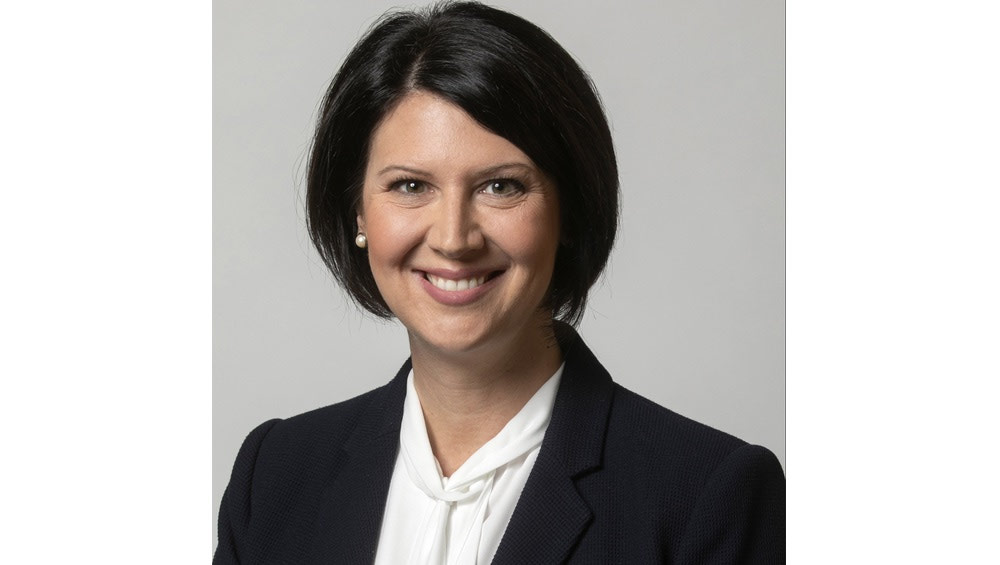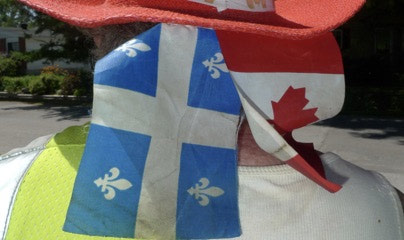Mayor France Bélisle in interview with editorial writer, Ian Barrett: Bélisle asks that Aylmerites participate in consultations
Ian Barrett
Barrett: The first question – So, it’s very well known that Gatineau is experiencing a housing crisis and that there is a need to densify. What do you base the choice of locations on for these housing projects currently concentrated in Aylmer and, more particularly, in the Plateau? Are there plans to accelerate densification in other areas of the city in the coming years?
Bélisle: Well, how does it work? There are, I would say, three main plans. There's the development plan that was done in 2015 that outlines how you're going to develop your territory. Then there is an urban plan, which is a development tool, and then there are the zoning regulations, which are another development tool. There were also public consultations on the plans developed in recent years. Densification is part of the plans, and we want this in all parts of the city. So, of course, we see significant densification in the Plateau, because there was land available, but, I would point out that we also see it in other areas. There are a lot of projects in the Hull sector and in Gatineau. We see it more and more in Masson-Angers and Buckingham. I would invite Aylmer residents to visit other sectors to see what is happening in other parts of the city. But it's true there’s a boom because of demographic growth and we see it a lot in Aylmer, and so we work with our three tools. So, the development plan, the urban plan and the zoning regulations define the density. That's what we're basing it on and we've allowed density in our areas based on our underlying infrastructure. So when we adopt a project, well, it's because in our plan we said that we were able to accommodate a number of units in such and such a sector.
Barrett: Well, that'll actually lead in very nicely to the next question. As we densify, how can we ensure that community services are easily accessible to all residents? In particular, concern for local residents in the western parts of the city is access to health care services, something that, of course, is under provincial jurisdiction. One example of that growing need is that we see many retirement homes being built in Aylmer. Unfortunately, the access to health care, if anything, has gotten a little bit more complicated as the Hull Hospital moves a bit farther east. So how can we develop our neighbourhoods to account for limitations in, for instance, access to health care? And one other big thing is fire and police services. We see that it's been recognized that there is a certain deficiency there. So how can we work to be able to improve that? And for the latter, certainly in northern Aylmer, that's a big issue. What can we do to improve the availability of these critical services?
Bélisle: Well, if we're talking about health care services, this is a provincial issue, so I think the question needs to be addressed to the provincial government. We also have to recognize that what we're aiming for is also to have a hospital in a strategic area for all residents. The decision by the provincial government to put the hospital near the casino was also considering public transportation, how central it was. And we have to remind our residents of that as well.
It is a regional hospital and we haven't been talking a lot about what's going to be happening with the existing hospitals because there is a plan for that. Buckingham will probably have a new mission. Same for Gatineau, same for all. Everything's going to be changing. But this is, of course, a provincial matter. In terms of firefighters and police, this is different. And it is very particular because the province is giving the guidelines and we need to apply these guidelines on our territory. This is what we're doing. So in Aylmer, we are going to build a new fire station. We've also voted $16 million to improve the existing police station in Aylmer. So we're meeting them, with the criteria coming from the provincial government. And, of course, with the police headquarters that we're talking about. I'd like to see it closer to the West part of our city. But as you know, we're going to go through public consultation. I'm asking people from the west side of our city to come to the public consultation and have their voices heard.
Barrett: Just to go into that a little bit deeper for the health care services, would there perhaps be, for instance, a bit of a transition where we could begin to locate more of the retirement communities closer to the new hospital just to reduce the transit times for people who might need health care services more often?
Bélisle: I cannot respond to that question. I know, it would really be in the Quebec government's planning. And I think also in the re-evaluation that they're going to do of existing hospitals, like the hospital in Hull, for example. What’s going to be happening with the Hull hospital? Yeah, for now, what the government is saying is that it's going to be a swing space for a while until the new hospital is built. And then what's next?
Barrett: As we saw with the Gatineau Hospital, what we need is not so much infrastructure, but staff. So hopefully they'll be able to staff it.
Bélisle: There is an interesting comparison to make with the education system. I'm not an expert on this, but in the education sector, we see that new colleges and universities attract students and professors, so maybe the same in health care. We could see the same thing in the same way as when the Gatineau Hospital was built. Specialists came from all over Quebec because they wanted to work in a new, more technological environment. I would tend to say that if you compare it to what you see in universities, the new hospital could become quite magnetic and attractive for that. But it is not just a hospital. We're talking about a campus. Yeah. I can't remember. I think it's between seven and 10 buildings that are going to be built around the hospital. And what we also want to do is to be able to have a university, medical and health care presence on campus. And I think that will also help to grow the number of doctors, nurses and specialists here in Gatineau, to fill the labour shortage.
Barrett: What are our options for making our neighbourhoods representative of the city as a whole, ensuring that no area is left behind economically? This issue is of particular concern in Old Hull and the east end of the city, but pockets of poverty tend to appear everywhere in Gatineau.
Bélisle: There are two things we did. We created a position at ID Gatineau, which is our economic development department, just to work with the business associations. It's difficult to have the expertise to attract businesses, for example, to understand urbanism well, to get economic development grants. So we put a person in the city in charge of working with these people. We've also increased the budget of all our business associations by $100,000 to try to help them diversify their economies and activities on main streets. We have created a new fund called the Gatineau Fund, for more vitality in city centres, particularly concentrated in the old commercial streets of former cities, but in all sectors of our city. We have increased the fund to support our neighbourhood associations. So we have made a lot of investments in community funds.
I have two very big concerns as mayor: homelessness and food aid. This is something that really worries me a lot. And with inflation and exploding costs, it's getting harder and harder for food banks. But basically, for all of our citizens, we see an explosion of homelessness in old Hull. It's a provincial jurisdiction, but it has a very large municipal impact. There are things we have done. I requested an emergency meeting with the minister responsible to discuss the issue of homelessness. I convinced my colleagues to approve $100,000 in emergency funding for Moisson Outaouais, and also to help the other food banks.
Anything we can do to try to help, we must do in the Outaouais, not just in Gatineau. The government should inject more than $30 million more into community services.
I find the impact of a hungry person very worrying. The impact of homelessness is that citizens feel less safe. I'm not saying that homeless people are violent with people, but the citizen's impression of safety is important. Our police officers have to do a lot of interventions in the name of safety. There are a lot of mental health issues. People who are alone at home, who are in distress, who have problems of poverty, of money. There is a very significant impact on municipal services. [We do] everything we can to influence the Quebec government to help organizations get more money. I am doing this. I don't think it's going fast enough. I don't think it's enough. When you have people who can't eat three meals a day, that's unacceptable.
Barrett: Honestly, the cost of living is expensive.
Bélisle: It's really apartments. Let's talk about the housing crisis. A 4½ apartment is $1,275 on average. But in Quebec, we are among the cities where housing is the most expensive. So, we're really in a city where it looks like we have extremes that we have to deal with.
Barrett: Neighbourhood governance is critical to meeting local needs, but for this we need active community leaders. Aylmer is particularly strong in this sense. Other neighbourhoods have less organization. Old Hull in particular continues to lose long-term residents to areas farther east or west. So what can be done to foster community involvement and attract long-term residents to areas like old Hall? How can these neighbourhoods become more attractive as places for long-term residents to settle in?
Bélisle: Well, I think there are two goals in the governance issue. We set up a citizen participation committee. We had a citizen participation policy that dates back to 2004-2005, which is almost 20 years old, and we are in the process of reviewing how we are going to work with citizens in the interaction we have with them. Gatineau has created a new department called the Service de l'interaction citoyenne, which will become a champion in the city so that the city interacts and communicates better with its residents. So we're working on that. There are elected officials from the municipal council who sit there, but there are also citizens, and representatives of the citizens' association.
The rural area has older people, not in all areas, but they are getting older. So that, I think, is part of the explanation. What we can do for Hull, I think, is to animate the city centre and then densify the city centre, which we are doing. I would say that we had a jab with the pandemic because we had a great momentum of restaurants, of activities in the city centre that were fuelled by the public servants who were here until the pandemic came. We have fewer public servants; it's harder for businesses to survive. There are fewer businesses; there is less interest for people to set up shop. So we're trying to work on that. We have to find ways. We have to find ways to create a new critical mass of people in the city centre. Densification is a good idea.
But nobody will come, even if you have a great condo downtown. Who wants to come here if there is no grocery store, no pharmacy, no butcher? No. So we need to work on this. And we're doing this. It's going to take time.
So the whole question, I would say, is as much about the creation of shops, the arrival of shops and then the arrival of residents. Then the densification is really very important, and then it drags on. It also requires a vision of the city centre. So we have a plan, we have a vision for the city centre.
Yes, so what comes first? You know, it's the residents, then the shops where the shops bring in the residents.
Barrett: How can we avoid all the condos ending up on Airbnb?
Bélisle: The government has legislated on this. The difficulty is the inspection. Airbnb legally, it's fine. But how can we be sure that the owner of a property is respecting the law? Right now, it's the Quebec government who's looking at the owners and accreditation.
But the difficulty is in the inspection. There are already regulations. But how do you enforce the regulations at the moment? It's the Quebec government that does that, and I'm happy to see that there are people who have had their tenants' contracts changed to prohibit Airbnb.
So that's interesting because we have a lot of rental buildings in the city centre. You know, as they started to have quite a few parties, the building owners had clauses changed in the tenants' leases saying that Airbnb was prohibited. So if you want to do long-term rentals that's fine, it's for a year, two years, whatever, but not short-term. So we also have owners who have taken action. That's great. With the announcement two or three weeks ago about Airbnb, I think we'll give it time to see what the government will do. And what will Airbnb do? The key is in the inspection. The Quebec government must put more inspectors on the ground.
Airbnb has also agreed to indicate the tourist corporation code in each ad. If there is no code in the ad, the ad cannot be published. And that has already created a little momentum on the platform.
It's the others after, all the others indeed.
Because in a housing crisis like the one we are experiencing at the moment, a balance must be found. I'm not against Airbnb, but all the apartments cannot become Airbnb all the time, not in the crisis that we're facing right now.
Barrett: And then you have an empty downtown because people come here and stay in a short-term rental to go to downtown Ottawa and then they leave. And then how do you make local businesses viable? It's a big challenge.
[ Voir l’édition du 10 mai pour l’entrevue en français ]






